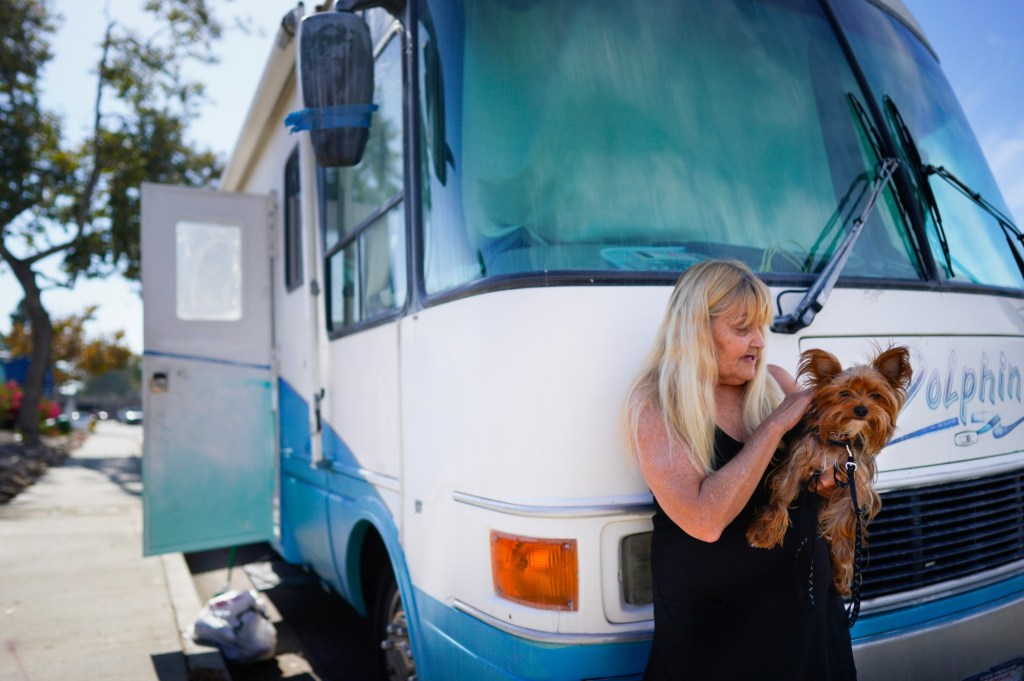San Diego police have ticketed Teresa Lunsford at least 15 times since April for parking her RV — her only home — and her Chevy sedan on public streets and in public lots overnight.
Now Lunsford, who at 66 is homeless and disabled and relies on a fixed income, owes at least $1,486.50 in parking tickets.
“This is my biggest problem,” said Lunsford, sitting on her walker outside her Dolphin motor home in Serra Mesa and holding plastic sleeves of parking citations in her hand. “It really does put a lot of pressure on me.”
Since July, San Diego has ramped up enforcement of a city ordinance that prohibits RVs and other oversized vehicles from being parked on public streets and lots between 2 and 6 a.m. That enforcement has particularly impacted homeless people like Lunsford who live in their RVs.
Now homeless advocates say the city is violating the terms of a court-approved settlement it agreed to last year — an agreement that was supposed to give homeless people living in RVs on city streets a viable alternative.
The city offers what it calls a safe parking lot for people to park their RVs to avoid getting ticketed, but few people are using it. Many say they can’t afford the extra gas money they would need to move in and out of the lot every day.
San Diego’s oversized vehicle ordinance became law in 2014 after residents complained about vehicles being parked for weeks or months in neighborhoods, blocking driveways and views and affecting public sanitation.
In recent years, enforcement of the law has fallen heavily on homeless people who can only afford to live in their vehicles. Homeless advocates say it’s a broken system that only compounds their poverty by saddling them with hundreds to thousands of dollars in debt that only keeps piling up if they can’t pay the fines on time.
The city has to enforce parking laws, which apply to everyone regardless of housing status, in order to maintain the quality of life in the city’s most-visited neighborhoods, said city spokesperson Matt Hoffman in an email.
The city fields hundreds of complaints each year about accumulated trash and a lack of parking access from motor homes parked there for months, he said. The impact is especially acute in San Diego’s beach communities.
“It’s critically important those areas have equal access to all. When hundreds of motor homes occupy the area indefinitely, it restricts this access for everyone and results in unsafe and unsanitary conditions,” Hoffman said.
Still, the city continues to enforce the oversized vehicle ordinance “with a compassionate approach that focuses on connections to services,” he said.
San Diego police’s Homeless Outreach Team has educated homeless people about the safe parking lot program and how to avoid tickets for oversized vehicles, and has helped them get connected with services like housing help.
“Issuing tickets is not the city’s goal,” Hoffman said.
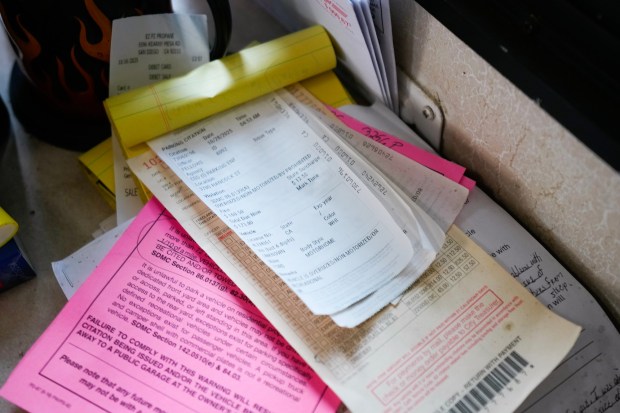 Kevin Denczek, 67, has several parking citations on the tabletop of his RV home. (Nelvin C. Cepeda / The San Diego Union-Tribune)
Kevin Denczek, 67, has several parking citations on the tabletop of his RV home. (Nelvin C. Cepeda / The San Diego Union-Tribune)
A group of homeless plaintiffs filed a class-action lawsuit against the city in 2017 over the way they say the oversized vehicle ordinance — as well as a city ordinance prohibiting sleeping overnight in vehicles — unfairly impacts homeless people who have nowhere else to go.
Under a settlement agreement approved by a judge last year, the city agreed to not enforce the two laws unless it could offer homeless people an alternative, legal place to park their vehicles overnight. That effectively meant suspending enforcement until the city could guarantee enough spots in the lots it runs for that purpose.
The alternative the city now offers is the H Barracks parking lot, a city-sponsored lot that provides 190 spots for homeless people to park their vehicles overnight in a secured space and offers help with finding housing, benefits, employment and rent assistance. The lot includes 120 spaces for oversized vehicles.
Per the settlement, the city has instructed police to offer someone a spot in a city-sanctioned parking lot before ticketing them for violating the oversized vehicle ordinance. Anyone who chooses to go into the safe parking program will not get an oversized vehicle ticket, Hoffman said.
Since resuming the crackdown in July, police have referred at least 245 oversized vehicle households to the city’s safe parking program, Hoffman said. Of those, 14 ended up using it. The city cannot force anyone to enroll in the program.
It wasn’t until July, when the city opened the H Barracks lot, that the city resumed its crackdown on oversized vehicles. From July 2 to Oct. 15, San Diego police issued 1,136 citations for oversized vehicles, Hoffman said.
The cost of that enforcement has risen. A month and a half after it resumed its crackdown, the city raised the oversized vehicle fine by 54% — from $112.50 to $173 — not including late penalties.
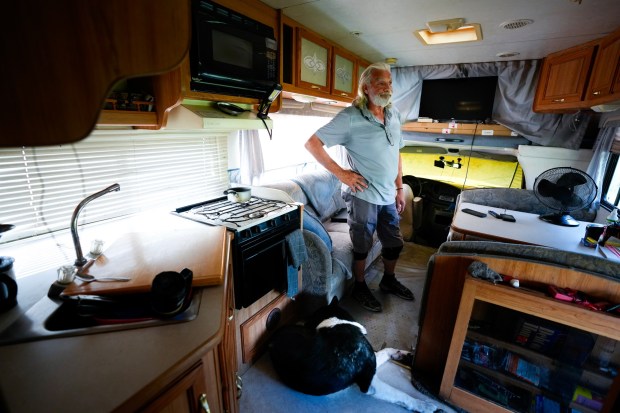 Standing in his 32-foot RV, Kevin Denczek, 67, tries to figure out how he’s going to make it until his November paycheck. Denczek spent the majority of his October food budget on his last parking citation. For more than a year, he has been living out of an RV and must relocate to different parking spots every 72 hours. (Nelvin C. Cepeda / The San Diego Union-Tribune)
Standing in his 32-foot RV, Kevin Denczek, 67, tries to figure out how he’s going to make it until his November paycheck. Denczek spent the majority of his October food budget on his last parking citation. For more than a year, he has been living out of an RV and must relocate to different parking spots every 72 hours. (Nelvin C. Cepeda / The San Diego Union-Tribune)
The class-action plaintiffs say the city is violating its settlement agreement because the H Barracks lot isn’t realistically accessible to many homeless people living in RVs.
One main issue for them is that the H Barracks lot is only open at night — which means people have to haul out their vehicles and belongings every morning, then haul everything back in at night.
Many have debilitating medical conditions that would make it difficult for them to pack up and move their RV every day. Several have smaller passenger vehicles that they said they have been told they can’t tow into the lots.
Most importantly, the plaintiffs said, it would cost them hundreds of dollars a month in extra gas to drive their vehicles in and out of the lot every day. Their motor homes guzzle as much as a gallon every five miles, and they can’t afford the extra gas.
Under the settlement, the city is not allowed to enforce the two ordinances unless city-designated parking lots are “reasonably available” to homeless people living in their vehicles.
Before ticketing somebody for parking an oversized vehicle overnight, police officers have to consider the “totality of circumstances” when deciding if a city-run safe parking lot is “reasonably available,” including whether there is adequate space in the lot, the type of vehicle and the distance to the lot, per the agreement.
“They’re being punished for something beyond their control. It’s not their fault they can’t go there,” said Ann Menasche, the plaintiffs’ attorney. “Why are they being treated like criminals?”
The H Barracks lot, which costs roughly $1.6 million each year to operate, didn’t see much traffic in its first three months. Only 29% of its spots were being used on average during September, up from 13% in July and 18% in August.
Some homeless people say police aren’t telling them about H Barracks at all. Instead, they say they’ve woken up to parking tickets left on their RV windows in the wee hours of the morning, often between 2 and 4 a.m., and police did not wake them up.
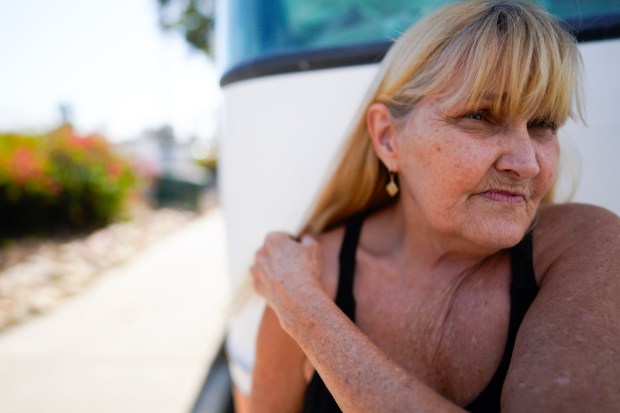 On Friday, Oct. 31, 2025, in San Diego, Teresa Lunsford, 66, who medically retired 10 years ago, stands next to her 32-foot RV she’s called home. (Nelvin C. Cepeda / The San Diego Union-Tribune)
On Friday, Oct. 31, 2025, in San Diego, Teresa Lunsford, 66, who medically retired 10 years ago, stands next to her 32-foot RV she’s called home. (Nelvin C. Cepeda / The San Diego Union-Tribune)
Even outside the protections of the settlement agreement, some homeless people say they are being ticketed repeatedly in the name of other city parking rules that penalize them for the same act of sleeping in their vehicles overnight on public property.
Homeless people are being fined for “violation of signs” posted at public parking lots, like those in Mission Bay, that prohibit parking between 2 and 6 a.m. They can also be fined for violating city rules prohibiting parking on a public street for more than 72 hours.
Most of the tickets Lunsford has received were for “violation of signs” for parking overnight at the South Shores lot in Mission Bay.
Lunsford has lived in an RV for the past decade. She hasn’t been able to find work or afford a more permanent home after she said she was robbed and lost her home business.
She can’t walk more than a block due to myriad health issues, including spinal stenosis and sclerosis, arthritis, chronic lung disease and high blood pressure.
One reason she says she can’t stay in a city-run safe parking lot: They don’t allow visitors who aren’t enrolled in the program, and she needs her daughter, who helps take care of her, to be able to come and go.
Lunsford got most of her parking tickets during September and October. There were four nights when she was ticketed twice — one for her RV, one for her car.
But she still couldn’t move her RV — she had a flat tire, and she had to wait until she could pull together enough money to get it fixed. Meanwhile, the tickets piled up.
She’s tried telling police about her situation. She’s ticketed anyway.
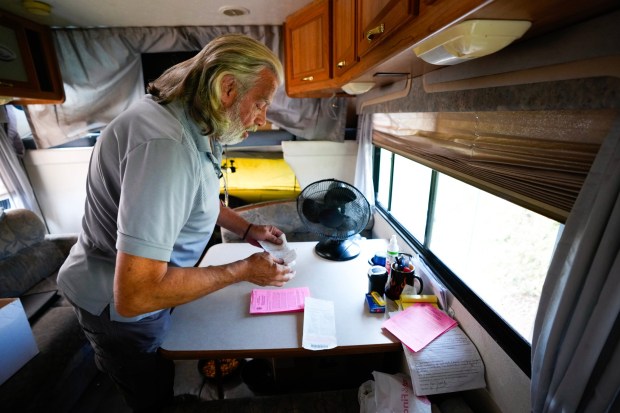 Kevin Denczek, 67, sorts through his paperwork looking for past parking citations. (Nelvin C. Cepeda / The San Diego Union-Tribune)
Kevin Denczek, 67, sorts through his paperwork looking for past parking citations. (Nelvin C. Cepeda / The San Diego Union-Tribune)
Since the city resumed its crackdown, Kevin Denczek, 67, has gotten five oversized vehicle tickets while asleep in his Leprechaun motor home. They total $804.50 in fines.
It took him a month to pay one ticket he got Sept. 10. As he was saving up to pay it, he got two more.
He parks on a street near the sports arena because it’s close to the Alpha Project shelter, where he goes to get food if he’s gone a couple of days without. It’s also near the CVS where he gets his medications, and a grocery store.
Denczek has lived in his Leprechaun motor home for 14 months. He hasn’t been able to work due to myriad medical issues — he has had several strokes and suffers from several other conditions, including heart, lung and thyroid problems. He says he hasn’t gone to H Barracks because he wouldn’t be able to bring his Dodge Durango with him, and he needs it to get to doctor appointments and run errands.
Social Security is Denczek’s only income, and most of it goes toward paying for his RV’s insurance, registration and gas, plus dog food for Echo, his Akita.
He would never let Echo go hungry. When he gets a parking ticket, he lets himself go hungry instead.
“Every time they hit me with one of these,” he said, “I’m gonna be the one going without food.”
